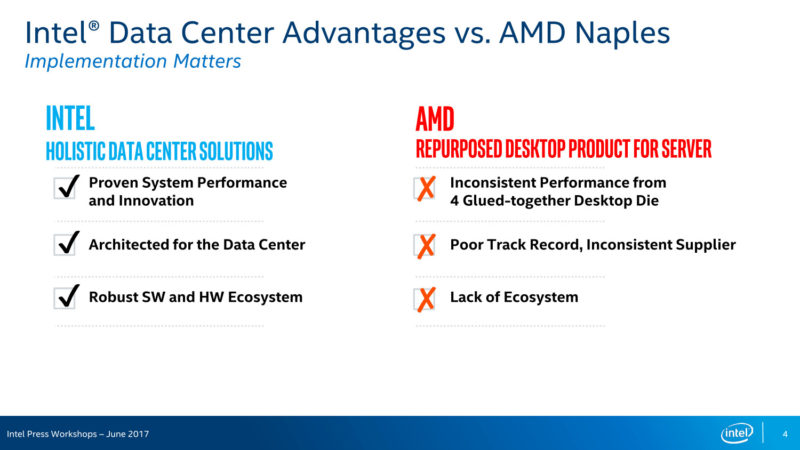Intel Attacks “Glued-Together” AMD Epyc Dies
Ashley Allen / 7 years ago

Last month, AMD unveiled its Zen-based Epyc server CPUs. The impressive processors follow on from the successful launch of Ryzen back in March. Ryzen’s incredible market reception has Intel worried, with Chipzilla making the most bizarre swipe at Epyc in a recent presentation. At its Xeon CPU launch event, Intel accused AMD’s Epyc chips as being an “inconsistent” and “repurposed desktop product” with “glued-together” dies.
“Intel Data Center Advantages vs. AMD Naples”
Intel attacked Epyc in a leaked slide from the Xeon event, while bigging up its own server solution. In the slide (courtesy of TechPowerUp), Intel says:
INTEL
HOLISITIC DATA CENTER SOLUTION
✓ Proven System Performance and Innovation
✓ Architected for the Data Center
✓ Robust SW and HW Ecosystem
AMD
REPURPOSED DESKTOP PRODUCT FOR SERVER
✕ Inconsistent Performance from 4 Glued-together Desktop Die
✕ Poor Track Record, Inconsistent Supplier
✕ Lack of Ecosystem
Ouch!

Is Intel’s Epyc Criticism Fair?
Absolutely not. As TechPowerUp points out, AMD specifically designed its Zen cores for “modularity and scaling” to “keep die-sizes to a minimum and yields to a maximum. This design allows Zen to offer more cores and threads than its rivals whilst drawing less power.
To demonstrate this, it compared Xeon and Epyc performance figures:

TechPowerUp explained:
“AMD has 8 more cores, 16 more threads, delivers 16% more performance than Intel’s e5-2699 system and 32% more performance than Intel’s non-“glued-together” Xeon 8176. AMD’s chip does all that while consuming 23% less power than the Xeon e5-2699, and 28% less than the Xeon 8176.”
So, “glued-together” dies wins! Hurrah for “glued-together”!



















